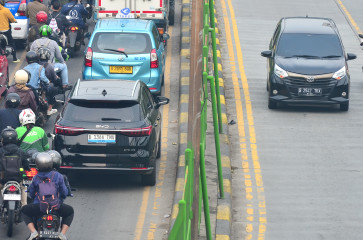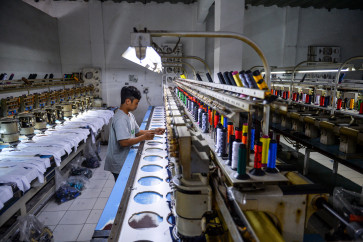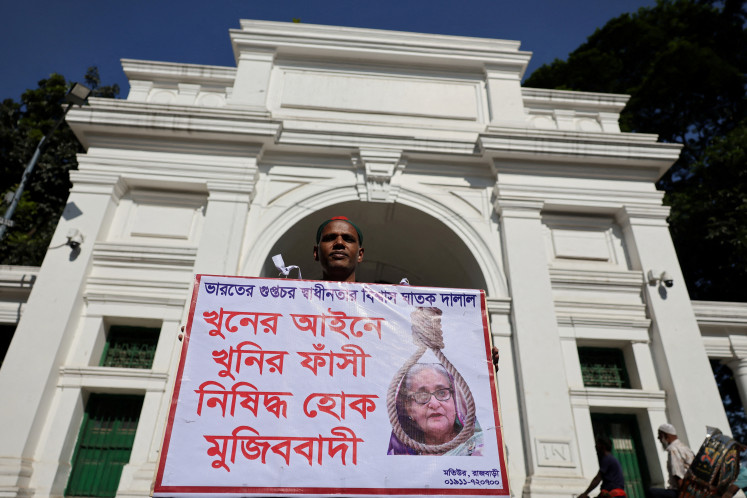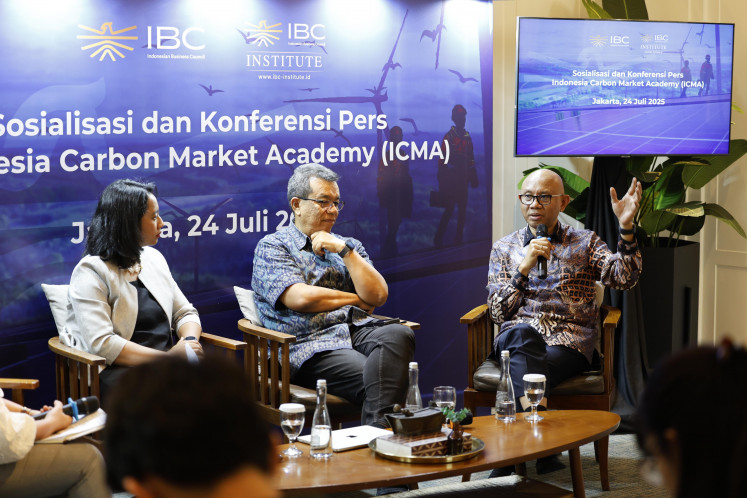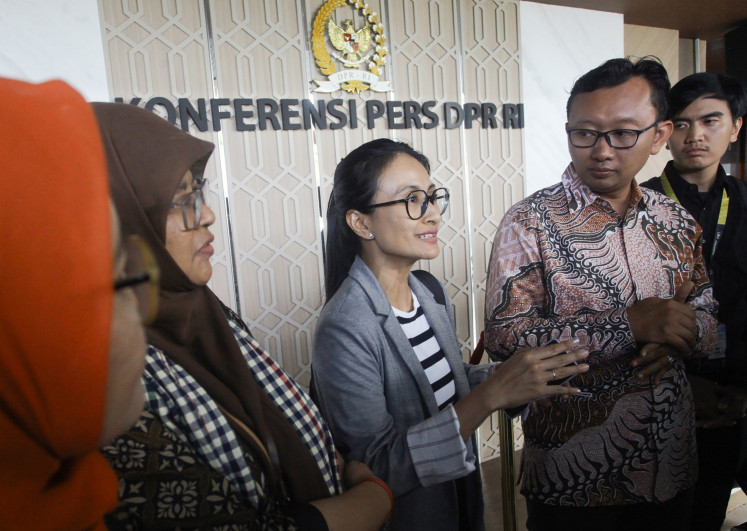Popular Reads
Top Results
Can't find what you're looking for?
View all search resultsPopular Reads
Top Results
Can't find what you're looking for?
View all search resultsThe IPT 1965 on hate propaganda
To this day victims and survivors of the mass killings and other crimes against humanity committed by the military and the militias associated with them after Oct. 1, 1965, still suffer from stigma. They are seen as being responsible for plotting a coup, and the women in particular are associated with alleged sexual orgies, in which the bodies of generals were mutilated.
Change text size
Gift Premium Articles
to Anyone
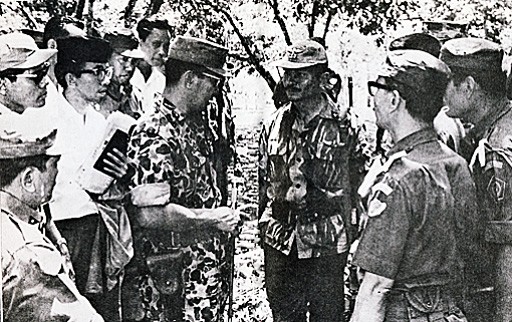 A dark history -- Maj. Gen. Soeharto briefs members of the Army’s Special Forces (RPKAD, now Kopassus) prior to the removal of the bodies of the Army generals who were murdered during an alleged coup attempt on Sept. 30, 1965, which was blamed on the now defunct Indonesian Communist Party (PKI). As the most senior military officer available at the time, Soeharto led all the operations to restore security and impose order in the aftermath of the alleged attempt. (JP/30 Tahun Indonesia Merdeka/-)
A dark history -- Maj. Gen. Soeharto briefs members of the Army’s Special Forces (RPKAD, now Kopassus) prior to the removal of the bodies of the Army generals who were murdered during an alleged coup attempt on Sept. 30, 1965, which was blamed on the now defunct Indonesian Communist Party (PKI). As the most senior military officer available at the time, Soeharto led all the operations to restore security and impose order in the aftermath of the alleged attempt. (JP/30 Tahun Indonesia Merdeka/-)
T
o this day victims and survivors of the mass killings and other crimes against humanity committed by the military and the militias associated with them after Oct. 1, 1965, still suffer from stigma.
They are seen as being responsible for plotting a coup, and the women in particular are associated with alleged sexual orgies, in which the bodies of generals were mutilated.
In actual fact the generals were murdered by soldiers under the command of two colonels, in a plot to abduct them and bring them before then president Sukarno.
Indonesian Communist Party (PKI) leader DN Aidit and a very small group of his closest associates were involved in this plot.
However, subsequently the whole party, which was operating legally and counted some 3 million members, as well as thousands of other unarmed and innocent supporters of president Sukarno, were blamed for this “coup” by Gen. Soeharto.
To dehumanize them, as a precursor to the mass killings, mass detentions, torture, enslavement and sexual violence that followed, a campaign of hate propaganda was engineered, spread by the media that was totally controlled by the military.
(Read also: 1965 Tribunal: State vs international law)
This propaganda campaign has been exceedingly successful, lasting longer than the Nazi propaganda against the Jews.
Other elements of this campaign held that the PKI was against religion, against the Pancasila state ideology and must be held responsible for the killings of religious leaders since the 1948 “Madiun affair” in East Java.
The panel of judges of the International People’s Tribunal on the 1965 crimes against humanity in Indonesia (IPT 1965), held last November in The Hague, considered two elements of this campaign.
The prosecution focused on two central charges of the decades-long campaign.
First, that the PKI was the “mastermind” behind the failed coup of Sept. 30 to Oct. 1 1965.
And second, that during the coup the young women present at Lubang Buaya (where the officers who were not yet dead were murdered and their bodies thrown into a disused well in East Jakarta) were encouraged by the PKI to engage in immoral behavior, seeking to seduce the generals in “a lurid, naked dance”, and then “castrating the generals” and “killing them after gouging out their eyes”.
However the post-mortem examinations of the bodies ordered by both president Sukarno and Soeharto showed no signs of castration or mutilation.
The autopsies demonstrated that six of the seven officers died as a result of gunshot wounds, and the seventh as the result of a wound to the abdomen, perhaps caused by a bayonet.
The non-gunshot wounds recorded on their bodies were consistent with being beaten by rifle butts or as a result of being thrown down a 36-foot well.
Most significantly, the doctors carrying out the post mortems did not record any damage to the officers’ genitals, which were apparently intact (they were able to observe in all seven cases whether or not the victim was circumcised).
After considering the evidence brought before them, the judges, led by veteran South African justice Zak Yacoob, concluded that the false propaganda campaign was indeed essential to the widespread systematic attacks against the PKI and all those deemed to be connected with it.
It was the first significant step in the attacks and is therefore a crime against humanity.
The propaganda version of the events of Sept. 30 to Oct. 1, 1965 had a significant dehumanizing impact, helping to justify the extralegal persecution, detention and killing of alleged suspects and particularly to legitimize the use of sexual violence against women.
This propaganda also contributed to the denial of survivors’ civil rights and the absence of any attempt to remedy the injustices against them.
The results of the autopsy were known to later president Soeharto but they were never released to the public.
The documents were only published much later, when professor Benedict Anderson discovered them.
In the early 1980s I had carried out research on the lurid stories of Lubang Buaya, interviewing a few of the girls who had been present there on that fearful night and who had survived the heavy sexual torture they had been subjected to.
All of them consistently denied that any dancing let alone castrating had taken place.
I wrote about this story in my novel entitled The Crocodile Hole, the launch of which was prohibited in the Ubud Literary Festival last year, as were all events related to 1965.
The accusation that the Indonesian Communist Party was the mastermind of the “coup’’ are also not supported by the available literature on the topic.
Although there are still many questions to be answered (e.g., who ordered the killing of the generals when the original plan was just to abduct them?) the judges of the international people’s tribunal found that the lies constituted the basis of a sustained campaign, lasting for many years and even to the present day, based upon allegations which were known to be untrue, and that it was intended “to discriminate, as well as to dehumanize, the target group and laid down the basis for the mass atrocities committed against them”.
The target group was said to be not only PKI members and sympathizers, but all those who were allegedly members of organizations affiliated with the PKI, and that this amounted to “a significant part of the civilian population” of Indonesia.
The conclusions of the judges of the IPT 1965 refute two elements of the hate propaganda spread against the PKI and supporters of Sukarno. It is critical that other elements of this campaign are subjected to similar scrutiny. Only then can Indonesia’s history books be rewritten and the rehabilitation of the many thousands of innocent victims begin.
***
The writer, a sociologist and feminist at the University of Amsterdam, is chairperson of the Foundation IPT 1965, and among others authored the novel The Crocodile Hole ( 2015 ) and Sexual Politics in Indonesia ( 2002 ).
---------------
We are looking for information, opinions, and in-depth analysis from experts or scholars in a variety of fields. We choose articles based on facts or opinions about general news, as well as quality analysis and commentary about Indonesia or international events. Send your piece to community@jakpost.com. For more information click here.

